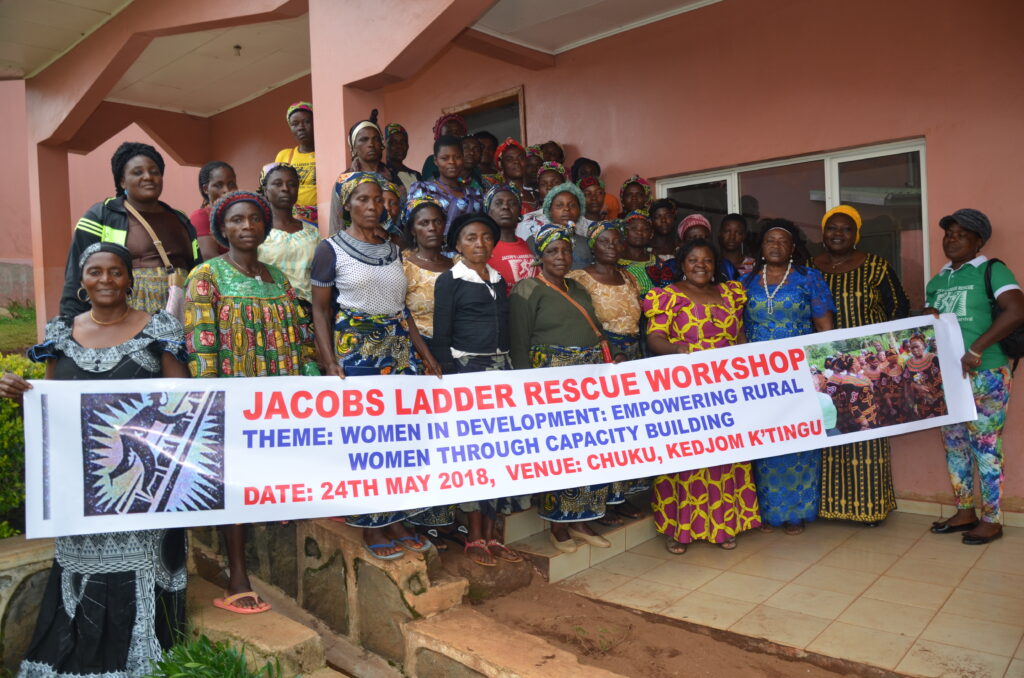JACOB’S LADDER RESCUE
It is a non-profit, apolitical, without religious segregation, autonomous organization aiming to provide multiform assistance to underprivileged (women) and vulnerable persons such as children and persons leaving with disabilities. It was created on the 22nd of January 2011 with Headquarters at St. Paul Street Mile 3 Nkwen, Bamenda, Mezam Division, North-West Region, Cameroon
HISTORY
Jacob’s Ladder Rescue came by inspiration from Ms. Judy Abong a long-time advocate for Women’s Empowerment at both governmental and community levels. The vision became a reality when she shared it with friends who had worked in projects geared towards improving on the status of women and girls. After interacting with the grassroots’ women, and concerned by the paucity of data to address the disadvantaged position of women, these women who have been involved for several years in implementing action-oriented programmes relating to women all came to the conclusion that, the low status of women was due to the fact that, they faced enormous challenges ranging from socio-economic, health to political and could be attributed to ignorance, poverty, cultural barriers amongst others. They were unanimous on the fact that a suitable way to reverse this trend and improve on the status of these women especially those in the rural areas would be to empower them through creating awareness of their rights and building their capabilities through assistance in knowledge and skills acquisition in a holistic manner that will enable greater self -reliance and responsibility.
They then agreed and created Jacobs Ladder Rescue (JALARES) on 22nd January 2011, and registered it in accordance with the dispositions of Law No 90/053 of 19th December 1990 bearing on the freedom of association in Cameroon. Jacob’s Ladder Rescue finally became legalized as an association administratively by Decision No. 63/E.29/1111/Vol.8/APAS of 4th December 2017.
Upon creation JALARES embarked on sensitization in secondary schools on issues related to youths particularly the girl child; carried out sensitization and expansion on the various commemorative themes of the Ministry of women empowerment and the family were taking further into the villages to enable the rural women have a better understanding. Also worked with youth groups presenting the organization (JALARES) and strategizing how to work in partnership and collaboration.
From 2016 JALARES stepped up work with the Rural Women in the domains of Human Rights, Health and Economic Empowerment. In the area of Economic Empowerment, Mobile Centres were introduced to help and build the skills for income generation. Workshops were organized to improve/create awareness on the notion of Human Rights and inter-generational communication. Capacity building programmers like Functional Literacy and Computer training programms were also introduced for women and youths respectively. The socio-political crisis degenerated to armed conflict whereby suspension of schools was used as leverage thus disenfranchising children of school going age. In 2019 JALARES and other organizations under the guidance of UNICEF initiated and instituted Education in Emergency. By this they created Child Friendly Spaces aimed at providing some catch up for the innocent children. Little did we know the socio-political crisis which began in 2016 in the English-speaking Regions of North West /South West of Cameroon would become a cause for concern and that the situation would degenerate to the existent precarious situation now prevalent.
An already bad situation was worsened by its fusing into the armed conflict. Activities in rural milieu have become a challenge due to the frequent gun battles a characteristic feature of the villages. JALARES now concentrates on working with Internally Displaced Persons and children (IDPs) who flee the villages for safer areas in towns.
In the towns and cities, a whole new phase of problems emerges which range from poverty, displacement, exposure to precarious lodging facilities, Abuse and desperation. JALARES thus joins the ranks of organizations in an effort to reduce the difficulties of the IDPs through appropriate interventions.

Women’s groups leaders at Chuku workshop
